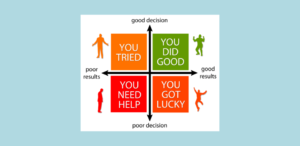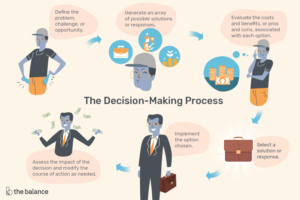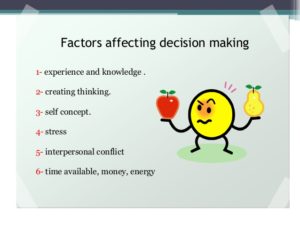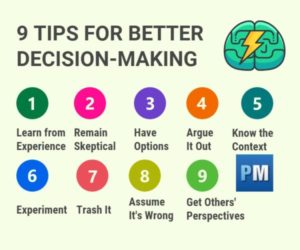
How poor decision cause an adverse effect in your workplace

A poor decision can adversely affect work productivity in the workplace. A poor decision in the workplace can get reworked with meditation and calculated thoughts on a decision to be implemented.

Decision Making is one of the crucial roles every employer should play. You will have a lot of people from team advisers to individual departments within your firm. They can give you various information and advice you of your options. But even in that context, the ultimate decision will come down to you. You will be responsible for setting every major directive and making every important call when charting the course of your business. While it can be intimidating, you can grow to become more skilled at it.
Decision making is like any other skill. When you first engage, you will be inexperienced. As a result, your performance will suffer. But if you can slowly eliminate your bad habits and replace them with positive practices, you will set yourself up for much greater overall success.
Given below are some of the worst decision-making habits. If you see them growing in yourself on the poor decision in the workplace, take proactive measures to get rid of them:

Poor decision-making habit that can affect your business badly

- Not doing the research
You should do thorough research before every practical decision you make. It is from selecting the target audience of your business to hiring a new employee. The amount of effort and time you spend on research should be directly proportional to the scale of the decision. Company-altering decisions will need greater research effort than deciding where to go to lunch with a potential new client.
Still, there are numerous factors you will always want to research before landing on one side or the other. It includes the current environment, the potential costs, the potential risks, and the potential outcomes. Also, check what type of outcomes have arisen as a result of similar decisions in the past. Once you have all the data in front of you, you will be able to make a much more informed decision.
- Going on instinct
Some business owners have forged a leadership position based on charisma and intuition. They are likely becoming entrepreneurs because one day, they simply felt like doing it. They plunged in headfirst because it seemed like a good thing to do.
These types of business owners generally have a great spirit. But they don’t last long in their role as they lack grounding. Even more tactical, logical entrepreneurs suffer from the “instinct” problem sometimes. In some cases, your gut instinct can aid you to decide between two relatively comparable options, relying on logic and sound advice is. But in the long term, the better strategy.
- Waiting too long
Some entrepreneurs face difficult decisions by detaining them for as long as possible. For example, if an employer is considering firing an employee, he may postpone the decision because it’s a difficult decision. Over time, he may get more information that can make his decision easier. However, a toxic employee who gets fired three months from now rather than today will cause three months of extra damage to your firm.
It is inadvisable to make prompt decisions, but it’s even worse to procrastinate on decisions that need to be made with relative haste. In most cases, a non-ideal choice is better than no decision at all.
- Relying on others
As a business head or leader, you should be open to opinions. You should listen to your investors, your mentors, your partners, your employees, and even your family and friends when weighing your options for serious decisions. However, you should never rely on others opinions to make your own decisions.
Never find yourself asking for someone’s opinion and then coming up with a decision immediately after. It could be a clue that you are over-relying on outside advice. It is your business, and you need to make your own decisions for it.
- Avoiding pain
There are several painful decisions you’ll have to make as an entrepreneur. You’ll have to fire people. You’ll have to break partnerships. You’ll have to give up on products. You’ll have to make significant financial cuts.
New entrepreneurs often make specific decisions that avoid short-term pain. They may opt to keep circulating a product that isn’t performing well to avoid admitting to the loss. Eluding short-term pain is never a good idea. In most cases, short-term pain must be withstood to guarantee long-term outcomes.
You should not vote “Good” decisions and “bad” decisions based on their final results. Instead, the quality of a decision should get defined based on the amount of effort the decider put forth in making the decision. Under these definitions, a “bad” decision may end up with a good result, and a “good” decision ends up with a bad result. However, over time, “good” decisions will always defeat “bad” decisions. So, it pays to eliminate these bad practices and consistently follow a sound decision-making process.




